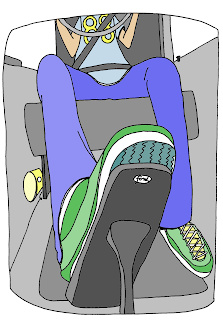These three broad groups make up the majority of cyclists. Do they get along with each other? I don't think so. They sure don’t ride together unless it's incidental, but then again, they’re not really competing for resources, yet anyway...and that's a big "yet", I mean, if there were a world of just bicycles in the streets...would they eventually begin to flip each other off and relish in name calling belittlement? I’m all but sure this would happen, as space on the road would still be a premium and thus competed for. In fact, I was just talking to a kid working the front counter of a hotel in downtown Sacramento, Ca about his commuting on the bike I saw safely locked up out front as I checked in. I asked him how getting around town was, if the city was "bike-friendly", how the infrastructure was (bike paths and the like), and the general attitude of drivers toward cyclists. All where favorable but what he added as afterthought...musing that possibly more troublesome than the inherent hazards a cyclist's fragile body encounters whilst commingling with heavy automobiles on the street were the droves of club riders who often speed up from behind in large packs on the city's many established bike paths, rude with shouts of “on your left” and often squeezing him and his bike from the narrow pavement as they sped by.
When I heard this, I have to admit, I got a little defensive as I've been in those groups that have taken the path with shear speed and Lycra-clad numbers, but until that point never thought of my actions as rude, quite the contrary...but then again, I had never heard firsthand or imagined the consequences of my actions from another's point of view.
Think about it...just look at how your attitude changes when you sit in auto traffic. Blood pressure and Cortisol levels rise, anger creeps in, what little mindfulness you have goes out the window with an urge to shake your fist, road rage begets the “effenheimer” and the entire day starts out on the wrong foot because your once peaceful and unified "group" began infighting over a resource. You are very alone at that point, a group of one, competing with other motorists for your piece of precious pavement...
Look, here's the deal...bikes and cars? They're just two machines that got in the middle of the proverbial human condition simply by giving us another way to label each other. A human condition that's been brewing and evolving within us since the Miocene...a constant struggle between our reactive, animal brain and our thoughtful, processing, symbolic brain. For years, bikes and cars, taking the blame for something they have nothing to do with but, again, giving us another way to label one-another as different, to group ourselves, to pick sides. A mere separation of the two I'm afraid, without really understanding the root problem, will just pass the buck to a different arena.
Groupism is at the root of this problem. To solve it, I'm convinced we can, we need to see this bigger picture, leave bikes and cars out of it and work on the mess that's between our ears. Limbic System be damned...we must overcome.








































